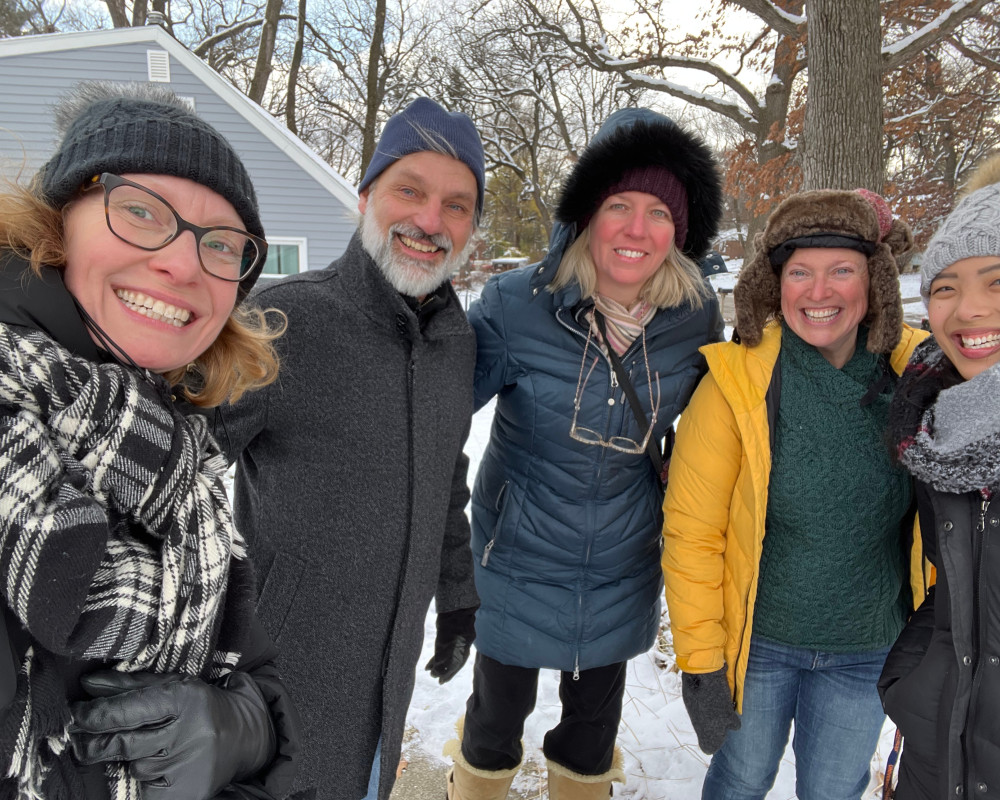
Photo (left to right): Claire Oleksiak, Sustain Dane; John Viner, Elevate; Kelly Hilyard, City of Middleton; Emily Kuhn, Middleton District 4 Alder; Daphne Xu, City of Middleton
To assist renter-occupied properties achieve housing resilience, health, equity, and climate goals, city staff in Middleton, WI, launched an innovation program that bundles building improvements.
How Did the Program Start?
In 2021, Madison, WI launched a program called the “Energy Efficiency Navigator” that helps small to medium-sized multifamily housing become more efficient, affordable, and resilient while reducing operating costs for owners and energy cost burden for residents. With funding support from Healthy Babies Bright Futures and the Mayors Innovation Project, the team in Madison took the Efficiency Navigator a step forward by incorporating both lead and mold abatement programs.
Middleton — a suburb of Madison — goes by the moniker “The Good Neighbor City.” Like any good neighbor, Middleton borrowed and implemented an idea that was working well. Thus, the Middleton Energy Efficiency Navigator Program was launched.
How does the Program Work?
Middleton city staff convened a partnership of local organizations including Elevate, Sustain
Dane, Middleton Outreach Ministry (MOM), and the Middleton Senior Center. Building owners of rental-occupied properties with two to eight units complete an online application. For buildings that meet primary and secondary criteria, the team provides complimentary energy efficiency assessments and step-by-step navigation to implement energy efficiency measures.
Support from Healthy Babies Bright Futures and the Mayors Innovation program added pilot lead, mold and pesticide remediation in select buildings.
How is the Program working in Middleton?
Regular stakeholder meetings with community organizations are key to making inclusive decisions that meet residents’ needs. Project partners crafted eligibility criteria, outreach materials, and the application together and secured final approval through the City’s Common Council.
The Project Team also took a guided walk in a target neighborhood. The District Alderperson and local building owners shared challenges they face with high energy bills, flooding, and home improvement financing.
A key goal of the program in Middleton is to establish best practices for integrating public health into energy efficiency work. There are many co-benefits and overlapping strategies for both decarbonization and healthy homes. In March, Middleton is hosting a half day Summit with public health officials, integrated pest management (IPM) specialists, and project partners to co-create program design that combines energy and public health work in affordable housing. Based on this learning, city staff will create a case study to provide information about how the pilot worked and to suggest steps forward when presented with any number of challenges.
The application process is open in Middleton. Our goal is to complete six to eight detailed building energy efficiency retrofits, and energy assessments for at least 10 buildings before early summer 2023. Assessments for lead, mold, and IPM will also be a part of this process.
How can my City Replicate this Program?
Middleton learned that building relationships between trusted community partners and organizations, public health departments, and city officials is a necessary first step. Energy efficiency work, housing issues, and public health are all connected but complex. It takes a team to bring it all together. Engaging that team early in the process will help the program succeed and obtain buy-in from building owners, residents, and the expertise needed to complete a building project.
There will be new opportunities for scaling up energy efficiency work because of historic funding from the Inflation Reduction Act (IRA) and Infrastructure Investment and Jobs Act (IIJA) over the next few years. Now is the time to start collaborating and educating elected officials, community organizations, and residents about the co-benefits of addressing both energy efficiency and public health to improve overall well-being.
More questions about Middleton’s work? Contact Kelly Hilyard, City of Middleton Sustainability Coordinator, at khilyard@cityofmiddleton.us.
Questions? To discuss this and anything else, please contact Bright Cities Program Director, Kyra Naumoff Shields at knaumoff@hbbf.org.


